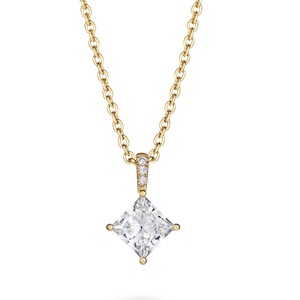
Lightbox Jewelry—De Beers’ widely watched, if somewhat controversial, lab-grown diamond brand—will now be sold in 10 independent jewelers in the United States and Canada.
The initial rollout encompasses 28 stores. Last year, Bloomingdale’s and Reeds Jewelers became the first physical retailers to stock the fashion brand.
The push into independents “is something we have had in mind for some time,” says Nick Smart, Lightbox’s commercial director.
He notes that some of the retailers chosen also sell other lab-grown diamond products, including engagement rings, which Lightbox has deliberately avoided.
“In some cases, we’ll be their only lab-grown offering,” says Smart. “In other cases, they have had established success in that space. For us, it was important to have a broad range of retailers. We feel its proposition is strong enough that it can really be attractive to retailers who have an established natural business as well as a lab-grown business.”
Lightbox sells its product for $800 a carat. Smart says he hasn’t heard many concerns that its price point will undercut the stores’ other lab-grown sales, noting that some retailers are already selling products that are pretty close to Lightbox prices.
“Since we launched, there’s already been a big correction in terms of pricing for lab-grown diamonds, and that seems to be continuing,” he says. “When we came out, we said that this space is developing really fast in terms of the manufacturing. We’ve definitely seen that in the market, as the manufacturing gets better in terms of quality, the prices have adjusted as well. That’s sort of a natural manufacturing cycle—as capacity comes on, the technology gets better and gets cheaper over time. That’s starting to filter through to retail.”
Despite its generally low price point, Smart says that the Lightbox products will offer “an attractive margin” for independents.
“I can’t offer specifics, but those who I’ve spoken to have been very happy with the margin,” he says.
He admits it’s possible that retailers could pop out the 1 ct. lab-grown stones and use them for low-cost engagement rings but adds “we certainly hope that doesn’t happen. It’s definitely something that we discourage.”
He says that, even though the brand sells online and has created pop-up stores, it hopes to add more independents shortly.
“This is just the first step for us, and it was enabled by the fact that our new Oregon production facility is now coming online,” he says. “What we see is, people who can physically look at and touch the jewelry and pick it up are really pleasantly surprised by what they’re getting. That’s an important part of the journey. The physical presence of the goods is really important, and we want to continue our presence in independents.”
The new retailers include Riddle’s Jewelers, based in Rapid City, S.D.; the Diamond Cellar in Columbus, Ohio; six California stores in the DeVons Jewelers chain; Padis Jewelry, San Francisco; Bailey’s Jewelers, Rocky Mount, N.C.; Geoffrey’s Diamond and Goldsmith, San Carlos, Calif.; Harris Jeweler, Troy, Ohio; three The Jewelry Center locations near Milwaukee; and IJL in Winnipeg, Manitoba in Canada. A full list can be seen here.
Top: A Lightbox lab-grown diamond necklace (image courtesy of Lightbox Jewelry)
- Subscribe to the JCK News Daily
- Subscribe to the JCK Special Report
- Follow JCK on Instagram: @jckmagazine
- Follow JCK on X: @jckmagazine
- Follow JCK on Facebook: @jckmagazine